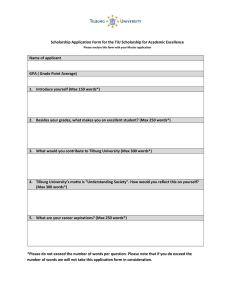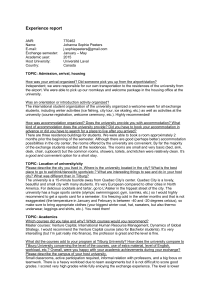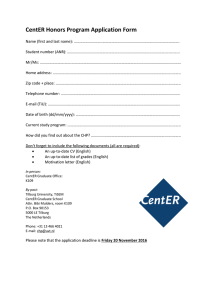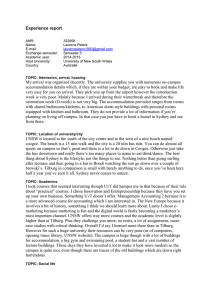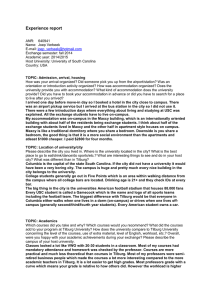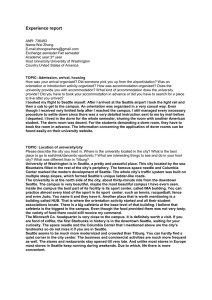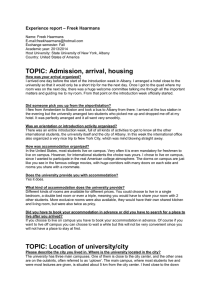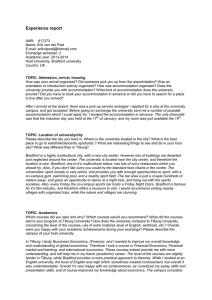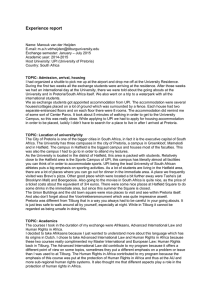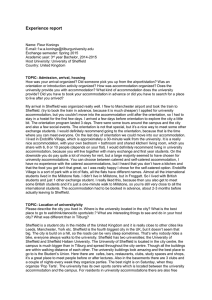GUIDELINES FOR WRITING THE EXPERIENCE REPORT
advertisement
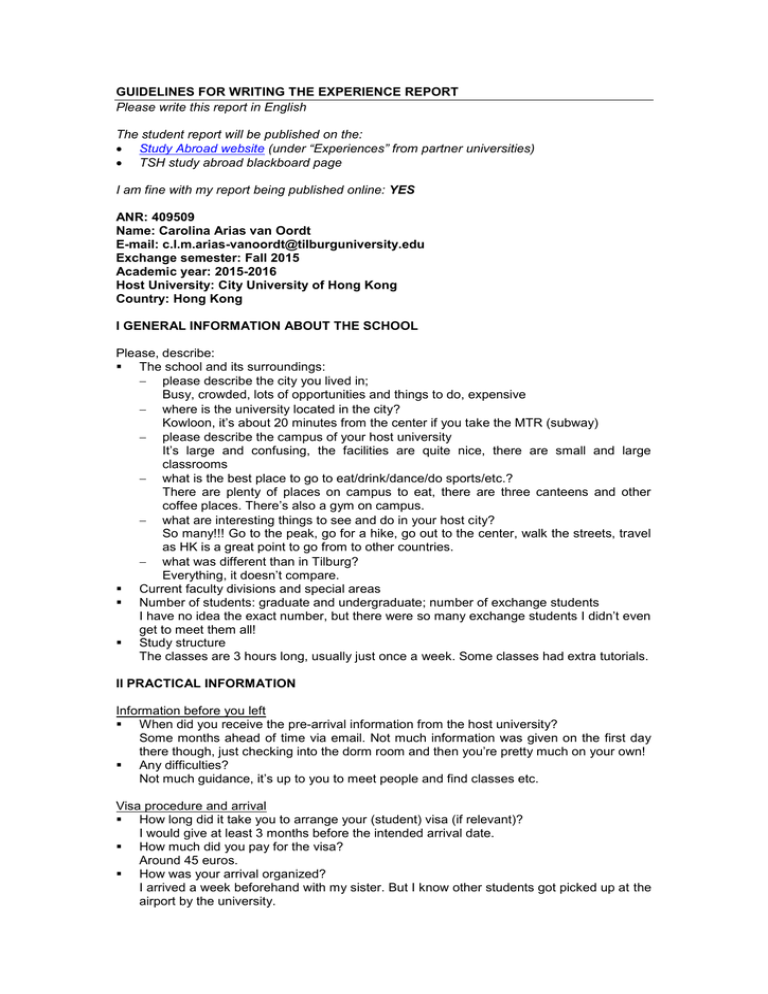
GUIDELINES FOR WRITING THE EXPERIENCE REPORT Please write this report in English The student report will be published on the: Study Abroad website (under “Experiences” from partner universities) TSH study abroad blackboard page I am fine with my report being published online: YES ANR: 409509 Name: Carolina Arias van Oordt E-mail: c.l.m.arias-vanoordt@tilburguniversity.edu Exchange semester: Fall 2015 Academic year: 2015-2016 Host University: City University of Hong Kong Country: Hong Kong I GENERAL INFORMATION ABOUT THE SCHOOL Please, describe: The school and its surroundings: please describe the city you lived in; Busy, crowded, lots of opportunities and things to do, expensive where is the university located in the city? Kowloon, it’s about 20 minutes from the center if you take the MTR (subway) please describe the campus of your host university It’s large and confusing, the facilities are quite nice, there are small and large classrooms what is the best place to go to eat/drink/dance/do sports/etc.? There are plenty of places on campus to eat, there are three canteens and other coffee places. There’s also a gym on campus. what are interesting things to see and do in your host city? So many!!! Go to the peak, go for a hike, go out to the center, walk the streets, travel as HK is a great point to go from to other countries. what was different than in Tilburg? Everything, it doesn’t compare. Current faculty divisions and special areas Number of students: graduate and undergraduate; number of exchange students I have no idea the exact number, but there were so many exchange students I didn’t even get to meet them all! Study structure The classes are 3 hours long, usually just once a week. Some classes had extra tutorials. II PRACTICAL INFORMATION Information before you left When did you receive the pre-arrival information from the host university? Some months ahead of time via email. Not much information was given on the first day there though, just checking into the dorm room and then you’re pretty much on your own! Any difficulties? Not much guidance, it’s up to you to meet people and find classes etc. Visa procedure and arrival How long did it take you to arrange your (student) visa (if relevant)? I would give at least 3 months before the intended arrival date. How much did you pay for the visa? Around 45 euros. How was your arrival organized? I arrived a week beforehand with my sister. But I know other students got picked up at the airport by the university. Did someone pick you up from the airport/station? There was this possibility given by the university. How was the reception at the school? Fine, not very informative. Was the administration and faculty well prepared for your arrival? Yes it was, they knew who I was and gave me my key. But this is only because I was living on campus. If you don’t get a place then I’m not sure if you get any reception at all actually. What problems, if any did you encounter? None. Orientation/Introduction activities Was an orientation or introduction activity organized? An IKEA trip to get things for your room, I recommend this as I met most of my friends there. Did the school’s students participate in the reception of the exchange students? There is a separation between the local students and the exchange students. They generally help to organize things but don’t participate. Did you have a student mentor/buddy? I didn’t, but other students did so I know it’s possible to sign up for one. Housing How was accommodation organized? Accommodation is given very scarsely as there are very very few spots. I was really lucky because I emailed the accommodation office. There is accommodation on campus, but more than half of the exchange students had to find their own. Did you have to book your accommodation in advance or did you have to search for a place to live after you arrived? Book in advance. What kind of housing does the university provide? Shared rooms (you and another person) or single rooms if you have a medical reason. What support did you receive from the school in locating housing? If you get one on campus, it’s great. If not, they don’t help too much for you to find one on your own. Were you satisfied with your accommodation? Yes it was really convenient and quite an experience to share a room with a Mainland Chinese girl. Any special issues or good ideas/useful websites for prospective students? If you don’t get an accommodation on campus, try AppleDorm in Kowloon. A lot of exchange students from CityU ended up living there and I think it’s the most affordable option. Living Costs How did you finance your exchange period, apart from the grant you received from Tilburg University? My parents. What were your living expenses abroad like compared to Tilburg? The accommodation was only 610 euros for the whole semester, but living and going out was really expensive. I’d say I almost spent twice/thrice as much as I did in Tilburg. But also because I did a lot more activities and traveling! What did you spend most of your money on? Activities, traveling, going out, events, shopping! What would you advice future students to spend their money on? Traveling! Please outline your approximate monthly budget whilst on exchange: Housing 610 for the whole semester Food Approx. 300 a month Transport Books Miscellaneous Academic Calendar Arrival date & introductory week Last weeks of August. First day of the semester? 1st of September Last day of classes? 20th of December Mid-term break? There were some holidays. Examination period? Last weeks of December. Any special events? The International Office Is there an international office? Yes they’re very sweet and helpful. Who is responsible for incoming exchange students? Her name is Popo. How does the international office function? Not sure. Are you satisfied with the information provided to you by the international office? Yes. Exchange promotion What kind of activity did you take part in to promote exchange to Tilburg University at your exchange university? There was an international university fair. Social Activities Which social activities are organized by the university/students for exchange students? Some small events for Mid Autumn festival, or other talks and things. They send you an email. Is there a student organization for international student? No. Did you have contact with local students? Yes mostly when you have to work in groups for class. Did you have contact with other exchange students? Yes mostly, there were so many! Did you travel to other places/countries during your exchange? Yes, Mainland China three times, Macau and Thailand Culture and Language Did you experience culture shock while on exchange? No but I had to adjust in the first week. How would you compare your host culture to your own culture? The students are a little less outgoing. What did you learn about your own culture while on exchange? What was different about your host culture than you expected? Mostly the food! How would you describe your host country’s culture? What did you like and not like about your host culture? Do you feel you learned a lot about your host culture, and if not, what would you like to learn more? Yes I did, it was a great experience. If you travelled to other cities/countries during your exchange, were they different than your host city/country, and how? Did you have any language problems with the faculty or other students? The English level was okay, but some professors didn’t speak it too well. Did you follow language courses during your exchange? Yes Mandarin Chinese Did you follow the Erasmus Intensive Language Course? No. III ACADEMIC INFORMATION Academic level at a host university In what language(s) are the courses offered at a partner university? English. Did you follow any courses taught in the language of the host country? Yes they were all in English. Which courses did you take and why? Psychology, Marketing and Social Entrepreneurship courses. Master choices/interest. Which courses would you recommend? There are plenty of cool course. The selection is wider than in Tilburg University. How would compare the academic level at your host university to the academic level at Tilburg University (e.g.: level of the courses, use of extra material, level of English, workload, etc.)? The course load mostly comprised of group projects, the level was a bit lower than Tilburg University. Is the teaching style primarily practical or theoretical? Both. What teaching method is practiced by the host university: case studies, group work, seminars or lectures (or a mix)? Group work and lectures. How would you describe the relationship between the students and the teaching staff? The teaching staff is helpful and attentive to students. In general, were you happy with your academic achievements during your exchange? Yes very. Exams What types of exams did you have to sit? Multiple Choice and essay formats. Other Can students easily access the library and its resources? Yes, you enter with your student card. Were there public computers available on campus/in university buildings? It’s difficult to get a spot if you don’t go in the morning. Description of Courses Please list all courses you have taken at a partner university in the form below: Course title and code Course level (BA/MA) Prerequisites, if any Form of exam ECTS credits you have obtained in total: Comments: Relevance, Difficult/easy, Practical/theoretical, Enrolment problems Course Name Ex: 1234 finance Psychology for Young Professionals Marketing Research International Prerequisites Exam Major at TiU none none Written Written/project Finance General Approved (minor/ elective extra) Elective Minor Business courses/statistics Business Written/project Business Minor Written/project Business Minor as / Marketing Social Entrepreneurship in a Globalised World courses/marketing couress None Written/project Please fill in all the courses you have taken General Minor Tips for the future students: Would you recommend an exchange period? Yes!!! Would you recommend your host university? Yes. What should prospective students absolutely not forget before going on exchange? Make sure you fight for your courses. If you are any other major than Social Sciences you will have to talk to all departments individually, as the TIU partnership is only for Social Sciences. How can they better prepare before going on exchange to this destination? Telling people that it’s really difficult to get a place on campus and to be prepared if they have to pay 800 euros monthly living off campus. Was there anything you should have arranged before departure that you haven’t? Not really. A picture is worth a thousand words If you took any pictures or made any videos that you would like to share with future exchange students, please include them (or e-mail them separately). Pictures that show your daily life or symbolize your exchange period are especially interesting for future exchange students. Blog If you kept a (photo) blog during your exchange that you would like to share (e.g.: www.waarbenjijnu.nl, www.blipfoto.com) with future exchange students, please let us know the URL. Contact details: Can the International Relations Office share your e-mail address with prospective exchange students, so that other students could contact you for more information? YES
